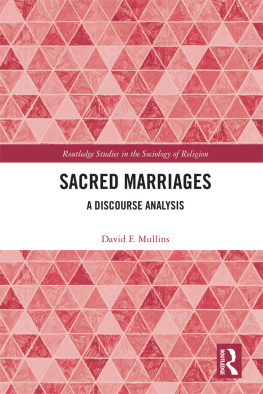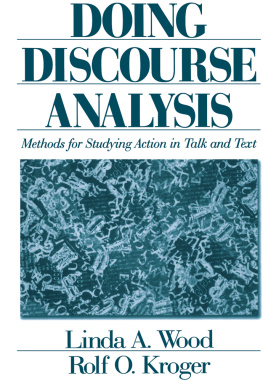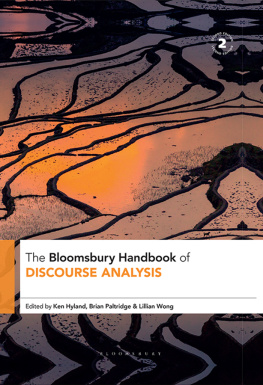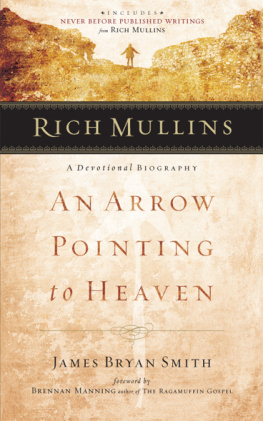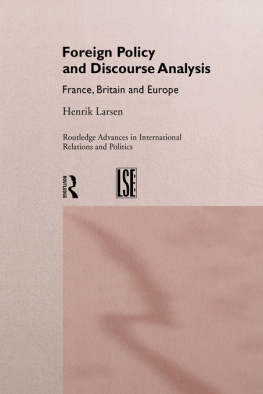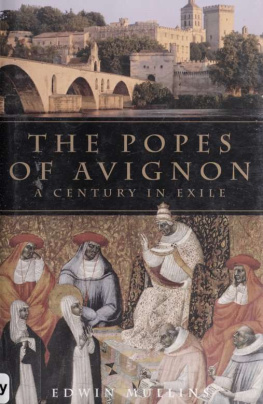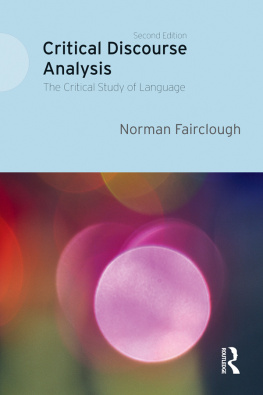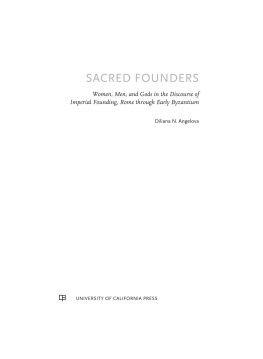David F. Mullins - Sacred Marriages: A Discourse Analysis
Here you can read online David F. Mullins - Sacred Marriages: A Discourse Analysis full text of the book (entire story) in english for free. Download pdf and epub, get meaning, cover and reviews about this ebook. year: 2018, publisher: Taylor & Francis (CAM), genre: Religion. Description of the work, (preface) as well as reviews are available. Best literature library LitArk.com created for fans of good reading and offers a wide selection of genres:
Romance novel
Science fiction
Adventure
Detective
Science
History
Home and family
Prose
Art
Politics
Computer
Non-fiction
Religion
Business
Children
Humor
Choose a favorite category and find really read worthwhile books. Enjoy immersion in the world of imagination, feel the emotions of the characters or learn something new for yourself, make an fascinating discovery.
- Book:Sacred Marriages: A Discourse Analysis
- Author:
- Publisher:Taylor & Francis (CAM)
- Genre:
- Year:2018
- Rating:5 / 5
- Favourites:Add to favourites
- Your mark:
- 100
- 1
- 2
- 3
- 4
- 5
Sacred Marriages: A Discourse Analysis: summary, description and annotation
We offer to read an annotation, description, summary or preface (depends on what the author of the book "Sacred Marriages: A Discourse Analysis" wrote himself). If you haven't found the necessary information about the book — write in the comments, we will try to find it.
Sacred Marriages: A Discourse Analysis — read online for free the complete book (whole text) full work
Below is the text of the book, divided by pages. System saving the place of the last page read, allows you to conveniently read the book "Sacred Marriages: A Discourse Analysis" online for free, without having to search again every time where you left off. Put a bookmark, and you can go to the page where you finished reading at any time.
Font size:
Interval:
Bookmark:

This book represents a new direction in the study of religion and marriage by using a postmodern theoretical framework focusing on gendered discourse and culture, to examine the meaning of sacred marriage within social contexts. Drawing upon data from in-depth interviews of couples in long-term, sacred marriages living in the American Midwest, together with an analysis of Christian marriage advice manuals, Sacred Marriages explores how couples use religious and nonreligious discourses and cultures to give their marriages meaning, and how those sacred meanings are used in their daily lives and the spaces that they embody. The study shows how religious and secular beliefs are combined to formulate cultural strategies for approaching the sacralization of marriage, and how religious and nonreligious discourses and cultures are ordered, depending on circumstances and social contexts. This often results in other relationships being subordinated in favor of the sacred bond believed to exist between husband and wife. The book argues that sacred marriage is a malleable concept, as people bend religious culture to form new and altered sacred marriages during emotional extremes. A thoughtful examination of long-term Christian marriages, this volume will appeal to scholars of religion and sociology with interests in marriage and the family.
David F. Mullins is Professor and Director of the Sociology Program at the University of Saint Francis, USA.
A platform for the latest scholarly research in the sociology of religion, this series welcomes both theoretical and empirical studies that pay close attention to religion in social context. It publishes work that explores the ways in which religions adapt or react to social change and how spirituality lends meaning to peoples lives and shapes individual, collective, and national identities.
Sacred Marriages
A Discourse Analysis
David F. Mullins
For more information about this series, please visit: www.routledge.com

First published 2019
by Routledge
2 Park Square, Milton Park, Abingdon, Oxon OX14 4RN
and by Routledge
711 Third Avenue, New York, NY 10017
Routledge is an imprint of the Taylor & Francis Group, an informa business
2019 David Mullins
The right of David Mullins to be identified as author of this work has been asserted by him in accordance with sections 77 and 78 of the Copyright, Designs and Patents Act 1988.
All rights reserved. No part of this book may be reprinted or reproduced or utilised in any form or by any electronic, mechanical, or other means, now known or hereafter invented, including photocopying and recording, or in any information storage or retrieval system, without permission in writing from the publishers.
Trademark notice: Product or corporate names may be trademarks or registered trademarks, and are used only for identification and explanation without intent to infringe.
British Library Cataloguing-in-Publication Data
A catalogue record for this book is available from the British Library
Library of Congress Cataloging-in-Publication Data
A catalog record for this book has been requested
ISBN: 978-1-138-09809-1 (hbk)
ISBN: 978-1-315-10453-9 (ebk)
Typeset in Times New Roman
by Apex CoVantage, LLC
To Tammy and Gabi, with love beyond words
I would like to thank Dr. John P. Bartkowski for his guidance over the past 15 years. He is the essence of a scholar teacher, and I am fortunate to know him and grateful for his sage advice. I also appreciate the opportunity afforded me by Neil Jordan at Routledge to write this book. I would further like to extend my thanks to all of the anonymous reviewers and colleagues who have critiqued my work. Additionally, I cannot express enough my appreciation to the administration and board of the University of Saint Francis who provided funding and a sabbatical in support of my research. Finally, I am indebted to the couples I interviewed for this study. They invited me into their homes, and shared the most private moments of their lives with me. I cannot thank them enough.
This book is about religion and sacred marriages. It represents a continuation of a body of scholarship that extends over a century. According to Burr et al (2012), the first generation of this scholarship began in the late 1800s and lasted through the end of the 20th century. It was marked by a focus on global markers of religious involvement (e.g., participation and affiliation) and their influences on marital satisfaction and stability. In the late 1980s, a second generation of scholarship emerged offering a more nuanced appreciation for the complexities of religion, encompassing specific beliefs and practices and their impacts on different dimensions of marriage and family processes. The most recent scholarship examines proximal measures of religiosity by focusing on the influence of the sanctification of marriage and family processes based on measures of the degree to which people perceive various aspects of life as having divine character and significance (Pargament and Mahoney 2005 and 2009). Much of this work originates in the field of psychology, and accordingly, researchers have attempted to quantify and measure the degree to which people perceive aspects of life to be sacred using indexes like the Manifestation of God and the Index of Sacred Qualities. Sanctification has largely been viewed as a psychological process with a spiritual reference point, influencing how people feel and act, stemming from their beliefs or experiences of the divine and sacred qualities (Hernandez et al 2011: 775).
In this book, I suggest an extension and redirection of the scholarship examining sacred marriages with a stronger focus on the social. The present paradigm in the study of religion relies on asking standard questions about how often people go to church, if they believe in God, how they perceive God acting in their lives, and what it means to be a Christian (Ammerman 2014). This includes strict standards of what it means to believe, to be religious, and to belong to a denomination or congregation. But, at times, these expectations of religion do not capture how people live. Words like faith, belief, salvation, spiritual, and sacred are polysemous holding multiple, at times contrasting meanings for people. The salient aspects of religion and the sacred in peoples lives should be how they live and what they do because of their belief in the sacred. To more fully understand the potential effects of religion and the sacralization of marriages, this study draws from religious and nonreligious spheres in the discourses and cultural scripts within written texts and the stories of people living in sacred marriages.
I conducted in-depth interviews with couples who were married more than 40 years and who said they believe marriage is sacred for religious reasons (see Appendix for a discussion of the sample and methodology). Following Swidler (2001), rather than compare multiple groups representing different cultural backgrounds, or present an exotic culture unfamiliar to the reader, this study examines what some might consider the most common and typically American cultural experiences of a dominant, homogenous group of mostly working-class, white, educated, U.S. Midwesterners. Indeed, many couples I interviewed claimed they were, no different from anyone else. Yet, when asked about loving, long-term marriages, they offered unique sociocultural experiences, and passionate, conflicted narratives that shaped their understandings of how religion influenced their marriages and families. I also analyzed 58 Christian marriage advice manuals to identify dominant religious discourse pertaining to marriage (see the Appendix for a discussion of the sample of Christian marriage advice manuals and the methodology I used to analyze them). The manuals were specifically recommended by participants, located in the lending libraries of participants churches, or acquired from publishers recommended by the participants based on their religious denominations.
Font size:
Interval:
Bookmark:
Similar books «Sacred Marriages: A Discourse Analysis»
Look at similar books to Sacred Marriages: A Discourse Analysis. We have selected literature similar in name and meaning in the hope of providing readers with more options to find new, interesting, not yet read works.
Discussion, reviews of the book Sacred Marriages: A Discourse Analysis and just readers' own opinions. Leave your comments, write what you think about the work, its meaning or the main characters. Specify what exactly you liked and what you didn't like, and why you think so.

